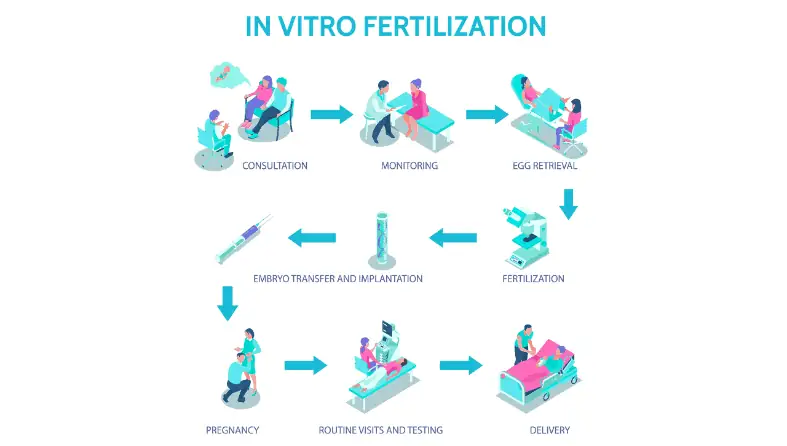THE A-Z’s OF IVF Procedure: YOUR GUIDE
IVF, IVF Doctor, IVF Treatment
We all want to become parents one day. But that dream starts looking distant if we are not able to conceive for a long period of time. And that’s when IVF comes into picture. In Vitro Fertilization or IVF is an increasingly popular procedure used by couples facing difficulties in conceiving. IVF has now become very popular among Indian couples. Over 6 million babies have been born using IVF procedure. Various advancements are being done in the medical field so that you can become a parent with ease. IVF is a concept that you can understand very easily. The same process that takes place in a female body is conducted outside the body in a laboratory to increase the chances of a successful conception.
“IVF can be understood as the extraction of the eggs and the sperm from the female and male respectively and fertilized together in a laboratory and the embryo is then implanted in the uterus of the woman.”
If you are trying to conceive, IVF could be the perfect step for you but it is important to consult trusted doctors before deciding whether IVF is the right option for you or not.
Understanding IVF: Your Step-by-Step Guide
The IVF procedure is a long journey and you must be well aware of all the steps before you begin the process. So, here’s a list of some do’s and don’ts and every other information you will need before heading to the clinic.
1. IVF Pre-Preparation And Routine Tests
The first step begins with the pre-preparation that occurs much before the actual procedure. It includes routine blood check-up, screenings for any Sexually Transmitted Disease/ Infection, hormonal tests, and ultrasounds along with an ovarian reserve test and one to ascertain the level of Follicle Stimulating Hormone (FSH) in women. These tests allow for proper identification of the body structure and also identify potential risks. These tests are very important as they set the base for the upcoming steps. Following a good diet is important during this time. Practicing clean eating habits by reducing the intake of processed and refined foods can help you prepare.
“ I had 2 IVF failures before I found out about Fertility Dost. They motivated me to stop drinking wine and made me follow a strict diet routine. Within two months my next IVF was successful. A good diet is very important if you truly want to get pregnant.”— Priyashree ( Member of our Fertility Coach Program)
TIP: While planning for IVF try to switch to a healthier diet while upping your intake of healthy fats such as mono-saturated fats as found in nuts, olive oils, and so on. Avocados, cashews, and so on make for perfect additions to your diet!
2. Consult & Select The Right IVF Doctor
This is the first step for any couple to follow before embarking on your IVF journey. It is very important to ensure that you approach the right professional with verified credentials. In recent times, there has been an increase in the number of unauthorized establishments and it is best to stay clear of them. An unauthorized clinic can play with the genetics of your egg, or suggest you to go for a donor egg when you don’t really need one. We at Fertility Dost help you select the perfect clinic & doctor to accommodate your comfort and preference. Our connections with accredited clinics and doctors allow you to pick the perfect match.
“ I would recommend everyone not to hurry while choosing your doctor. I made the same mistake and the doctor prescribed me wrong medicines, as a result one of my kidneys had to be removed. Finding the right doctor is very important.”— Rita (Premium member of our IVF Coach Program)
TIP:
- It is best to go for a clinic that has an embryology lab of its own.
- When you visit any clinic, talk to the patients in the waiting area. Not all of them are visiting for the first time.
- Ask as many questions as you can to your doctor.
3. The Stimulation Phase
This is a very crucial stage in an IVF procedure. It includes taking prescribed fertility medications that are usually intravenous to help your body prepare for pregnancy by allowing the release of eggs. The entire procedure revolves around your ovulation cycle and hormones to enhance the production of eggs are usually administered during days 8-14. These encourage follicles in the ovaries and based on personal conditions they may be administered daily on every alternate day. The most commonly injected hormones are either the follicle-stimulating hormone (FSH) or the luteinizing hormone (LH).
TIP: These hormones may cause symptoms such as pain and discomfort in some women and hence it is advised to not burden yourself with a heavy workload and plan your work schedule accordingly.
4. Retrieval Of Eggs And Embryo Fertilization
In this process the eggs will be taken out from your body. The egg retrieval is done between the 14th-16th day. Although only one egg is required for the process, 15-20 eggs are usually retrieved as not all of them are fit for fertilization. You will be given anesthesia before starting this procedure. The procedure is typically only 30 minutes but be prepared to remain at the clinic for the entire day.
You may opt to have your eggs retrieved on either the third or fifth day of your ovulation. If you opt for the third day, the egg will be taken for fertilization immediately. Egg retrieval on the 3rd day is cheaper as compared to retrieval on the 5th day.
“You may also opt to have your blastocysts frozen (if of a good quality ) frozen after the retrieval of eggs for a later date through a process called Blastocyst vitrification. This leaves them ready to use at any future date based on your convenience.”
Simultaneously a sperm sample will be retrieved from your partner and both components will be fertilized together .You should keep in mind that you may experience cramping, bloating which might last for a few days but usually diminishes on its own.
TIP: Refrain from very intense exercise or any strenuous activity before the retrieval of eggs as it can make it difficult. The male partner should refrain from any sexual activity 2-3 days before the retrieval date to ensure a higher sperm count.
5. Embryo Transfer
The fifth step is the transfer of the embryo to the uterus. Anesthesia is not given during ET and the process typically lasts for 5-15 minutes. Some amount of pain is to be expected during this period and you will be discharged 1 hour after the procedure. The period of 72 hours after the embryo transfer is the most important and you must refrain from all physical exertions and stress. Trauma, depression, or stress can lead to failure in the procedure and it is very important to stay healthy, calm, and most importantly positive during this period. You may expect to see bleeding/spotting, pain, and mood swings during this period which is normal but seek medical help if the problem persists.
Tip: Acupressure can have major benefits with regards to improving success rates, reducing stress, and pain associated with embryo transfer. If you regularly undergo Acupressure for one month before the transfer, you can expect to see better results.

Img src : freepik.com
6. The Result Time
Following the implantation of the embryo, there is a waiting period of 14 days after which certain tests will be conducted to check if the IVF was a success or not. Success rates range between 30-40% and depend on several factors and these tests help identify if the procedure was a success. A Beta HCG Test is performed to ascertain if the pregnancy is confirmed and a high level of this hormone indicates a success.
“ I had multiple IVF failures before I contacted Fertility Dost. They figured out that this was happening due to my anxiety levels. I conceived in my next IVF with the help of proper emotional counselling and some ayurvedic concoctions. It’s important that we are stress free while we undergo the IVF procedure.”
–Jyoti( Premium Member Of Our Fertility Coach Program)
Tip: The first Beta HCG Test sometimes may not be entirely accurate and you may be asked to come back in within 2 or 3 days to retake the test which is perfectly normal. Do not worry if your doctor calls you back for another test.
Everything you need to know about IVF cost
Due to the rapid advancements in technology and the growth in popularity of IVF, the procedure is becoming more and more affordable and is being frequently opted as a method to conceive for several couples. Based on where you choose to undergo the procedure and the specifics involved the prices could vary.
Given below are some of the average costs of IVF and related procedures to help you get an approximate estimate of the cost in India.
- Assisted IVF with Egg Donor- 2,50,000 Rs
- Embryo Donor- 55,000 Rs
- Frozen Embryos Transfer- 30,000 Rs
- Testicular Sperm Aspiration- 18,000 Rs
- Intracytoplasmic Sperm Injection- 2,20,000 Rs
IVF can be a very helpful procedure to assist you and your partner through your journey of welcoming the newest addition to your family. With several success stories, IVF has become a very trusted method of conceiving allowing you to break past barriers and live life with confidence and no regrets.






Your Comment Is Valuable For Us
Thanks For Your Feedback.